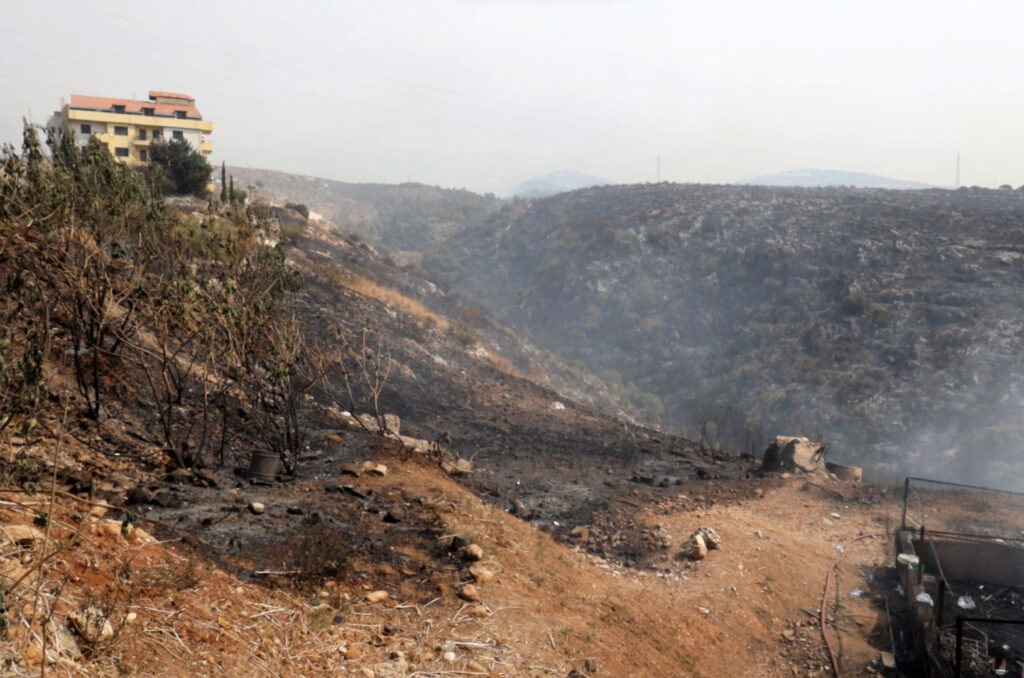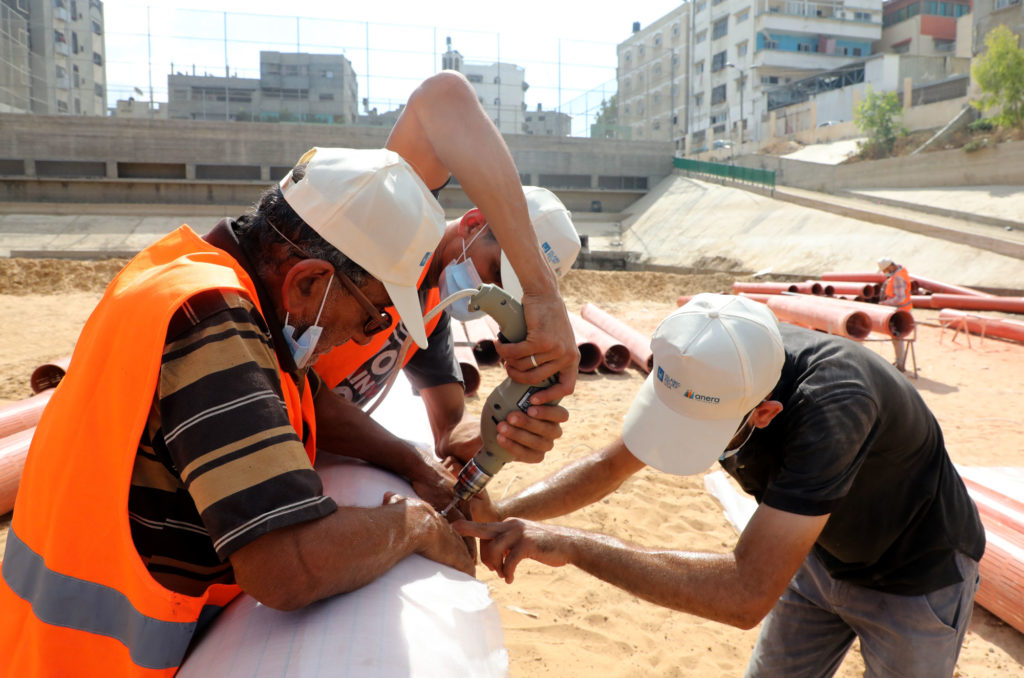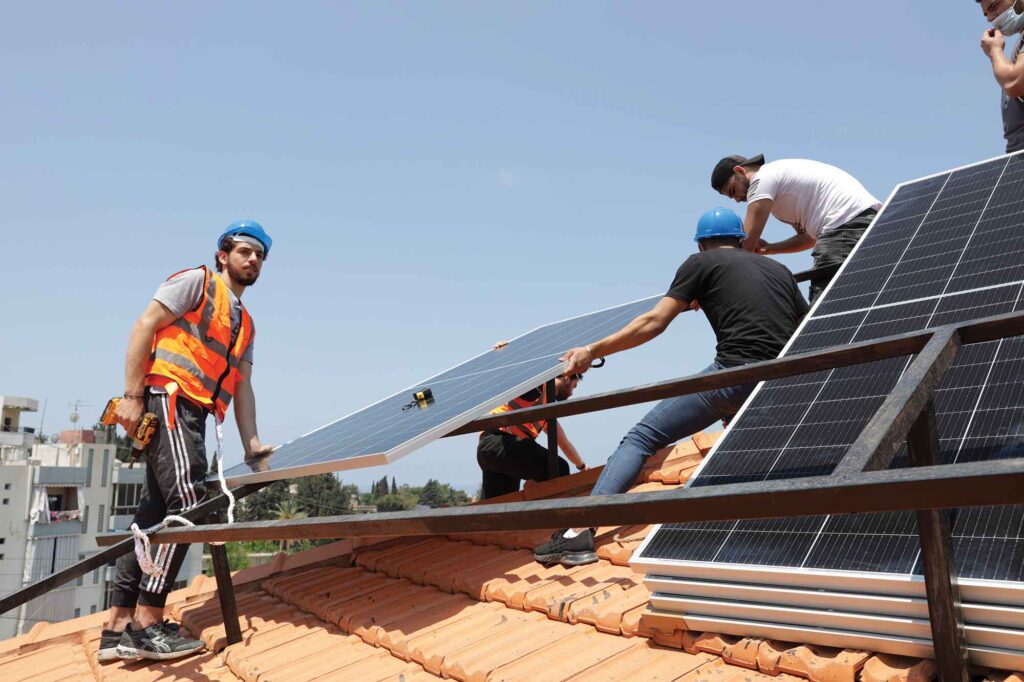Suffocating in the Heat
Posted in: Society & culture
Climate Change’s Deadly Impact on Vulnerable Communities in the Middle East
The Middle East, a region already burdened with conflict, displacement, and political turmoil, now faces an additional existential threat: climate change. The impacts of rising temperatures, droughts, and extreme weather events in the region are exacerbating the vulnerability of communities and compounding existing social and political challenges. Given the impact of climate change on the ongoing refugee crisis in Lebanon, Jordan, and Palestine, there is an urgent need for inclusive reforms and climate adaptation strategies.
To help advance these strategic priorities, Anera will be attending the 28th United Nations climate change conference — the COP 28 — in the United Arab Emirates this fall. Anera’s participation at the conference will be focused on the role of education in addressing climate change. Educating the next generation about the challenges ahead is a crucial step in preparing young people for the future.
Climate Change in the Middle East
Renowned analyst Frederic Wehrey warns, “Climate change in the Middle East will amplify pre-existing vulnerabilities stemming from conflict, displacement, marginalization, and corruption while also creating new risks. Governments in the region will need to adopt more inclusive reforms as part of their climate adaptation strategies.”
Heatwaves, droughts, sandstorms, floods, and rising sea levels are some of the challenges that the region faces. The Middle East, particularly Arabic-speaking countries, is highly exposed to these impacts. The effects will be felt differently across the region, with resource-poor countries being more severely affected due to limited adaptive capacities and inadequate infrastructure. Inequities in water and land management will worsen, exacerbating existing social and political issues.


The Hottest Week on Earth Ever Recorded
In a disturbing milestone, the first week of July 2023 marked the hottest week on Earth ever recorded. The Middle East has been particularly hard hit by the heatwave, which is expected to worsen as August approaches. The scorching temperatures not only broke records but also brought severe consequences to the region.
The Middle East, already warming twice as fast as the global average, is experiencing a rapidly changing climate that threatens the livelihoods, well-being, and stability of its communities.
Governance Challenges and Climate Adaptation
In the Arab world, a significant problem arises from prioritizing climate change mitigation over adaptation. This stems from governance issues, as centralized policies hinder the kind of grassroots activism that is vital for building climate resilience and making necessary adjustments to reduce harm. Moreover, the exclusion of vulnerable populations from climate discussions exacerbates the situation, leading to far-reaching consequences for human security, development, and stability.
The Impending Heat Wave Crisis
A study published in The Lancet sheds light on the gravity of the situation. If global warming continues, the number of heat-related deaths in the Middle East and North Africa is projected to rise significantly. By the last two decades of the century, heat-related deaths in the region could increase from an average of about two deaths per 100,000 people to about 123 per 100,000 people.
Without immediate action, some areas may experience an average temperature increase of four degrees by 2050. The goal of limiting global warming to 1.5 degrees, as laid out in the Paris Agreement, seems increasingly unachievable in the region.
According to research by the German Max Planck Institute of Chemistry and the Cyprus Institute, the situation is critical. Based on a ‘business-as-usual pathway’ where no climate action is taken, the Middle East will face unprecedented heat waves that will make life in some areas impossible. The coolest summers by the end of the century will be as hot as the hottest summer peaks between 1981 and 2010.
Water Scarcity and Vulnerability
Water scarcity is a major issue in the Middle Eastern countries where Anera works. In Jordan, rising temperatures, droughts, and increased evaporation exacerbate the already dire situation. The response to climate change in Jordan lacks an integrated approach due to insufficient political will and capacity. Efforts to conserve water and improve water management must be effectively managed to reduce the impact of climate change on agricultural production and rural-urban migration.
Water scarcity is a problem in Lebanon as well, primarily due to poor management, which is made worse by climate change. Less snow and higher temperatures mean groundwater levels are going down – the main source of water for drinking and farming. Water shortages put a strain on infrastructure and management systems, threatening livelihoods and escalating tensions, as seen in the case of two men shot dead near Lebanon’s highest peak, Qornet el-Sawda, as a result of a long-running dispute over water supplies in the region. The influx of refugees has further strained water resources in Lebanon.
Palestine, on the other hand, faces complex challenges related to climate change and water scarcity. Rising temperatures and potential declines in rainfall result in more frequent droughts, exacerbating the already dire situation. However, in addition to these challenges, Israel’s ongoing occupation policies have a profound impact on food systems and further compound the difficulties faced by Palestinians.
Water competition and access remain critical issues in Palestine. Israel exerts control over all groundwater sources in the West Bank, thereby depriving Palestinians of access to the clean and reliable water sources necessary for their well-being. The limited jurisdiction of the Palestinian Authority over a portion of the West Bank and the Israeli-enforced blockade on Gaza further impede effective climate and water management strategies in the region.


Energy
In addition to climate change and water scarcity, the Middle East faces a crippling energy shortage with far-reaching consequences. Despite its abundance of fossil fuels, the region’s energy landscape is marked by complexities in management, consumption, and distribution.
A primary concern is the region’s heavy reliance on fossil fuels for electricity generation, which contributes to greenhouse gas emissions and exacerbates the effects of climate change. This reliance also makes the Middle East vulnerable to global energy market fluctuations. Political conflicts and regional instability further complicate the development of renewable energy sources and hinder the implementation of sustainable energy policies.
Strategic energy diversification and the adoption of renewable energy sources are critical to addressing these challenges. By embracing solar, wind, and other sustainable options, the Middle East can simultaneously reduce its carbon footprint, mitigate environmental damage, and foster economic growth. International collaboration and investment are essential to supporting this transition, ensuring a more sustainable energy future for the region, and contributing to global climate action.


Prioritizing Climate Action
Climate change poses a grave threat to the Middle East, amplifying existing vulnerabilities and contributing to the ongoing refugee crisis in Lebanon, Jordan, and Palestine. Climate change also affects host communities. Urgent and inclusive reforms are necessary to address the governance challenges hindering effective climate adaptation strategies. By prioritizing climate action, climate education, sustainable solutions, and fostering regional cooperation, the Middle East can confront the complex challenges of climate change while safeguarding human security, development, and stability.
Anera recognizes the significance of climate change education in fostering youth development and green economies. Education plays a central role in Anera’s initiatives and areas of focus, as it equips families, communities, and youth with the knowledge they need to improve their communities and positively impact their local environment. By promoting self-sufficiency and providing communities with tools and resources, we aim to create sustainable change.
Furthermore, our commitment to addressing climate change extends beyond local initiatives. Anera will present at the COP 28, the Conference of the Parties, which will be held in November-December 2023. By engaging in international dialogues and collaborations, Anera strives to contribute to the global effort to combat climate change and advocate for the inclusion of vulnerable populations in the climate change conversation, drawing from our program work at the nexus of water, energy and food security.
It is crucial to raise awareness, educate communities, and prioritize climate action to mitigate the far-reaching consequences of climate change in the Middle East. Through collective efforts and immediate action, we can foster a sustainable future that ensures the well-being and stability of the region’s communities.
As climate activist Hussein Ghandour rightly states, “The majority of the population simply isn’t interested [in climate change], which is partly due to a lack of awareness and education.” By addressing this gap and actively involving communities, we can drive meaningful change and create a more resilient and sustainable Middle East.
OUR BLOG
Related
Part of a series on the impact of the war on all sectors of economic life within Gaza, Anera’s immediate response and plans for the future. Other posts cover housing, education, WASH, health and food production systems. Livelihood Recovery In Gaza, 57 years of occupation and…
InterAction and 50 Member CEOs, some of whom have organizations that work in Gaza, urge President Biden to take decisive and actionable steps to alleviate the humanitarian crisis in Gaza. Detailed within this letter are specific steps and commitments that…

